
The growing demand for biofuels is driving the bioenergy market, especially in Asia. Several countries on the continent have invested in this renewable sou
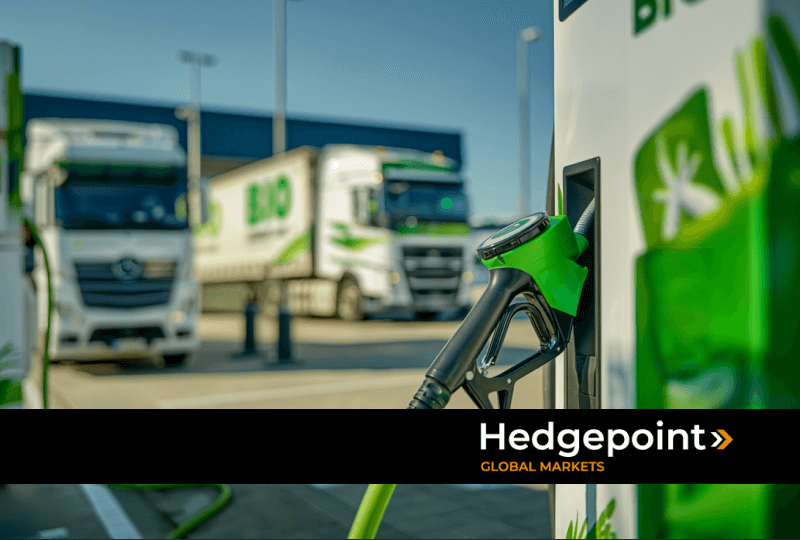
The growing demand for biofuels is driving the bioenergy market, especially in Asia. Several countries on the continent have invested in this renewable source and set increasingly ambitious production targets for the future.
Even at an early stage, the local bioenergy sector shows high potential due to the interest of large companies and governments. Currently, Singapore, China and India are leaders in investments to reduce dependence on oil exports. Ethanol, produced from sugar cane, which is abundant in the region, has become the main biofuel in Asia.
According to Market Research Future, the global bioenergy market is expected to grow by 11.74% a year over the next decade, rising from US$ 129.83 billion in 2023 to US$ 352.48 billion in 2032. The institution also indicates that, as demand for biofuels increases, technology will follow, developing more efficient and economical products.
See below for a graphic projection:
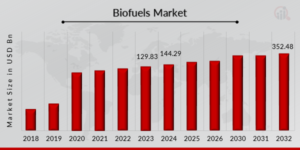
Southeast Asia plays a significant role in sustainable fuel production, mainly in the transportation sector. The main growing biofuels are aviation biokerosene (SAF) and marine biofuel (biobunker). Learn more about these two fronts of the bioenergy sector:
S&P Global reports that demand for SAF (Sustainable Aviation Fuel) is expected to increase significantly, peaking in 2035. Market efforts and regulations will be crucial to dominating the fuel mix by 2050.
Recently, Singapore’s National Research Foundation launched a $90 million program focused on the production of SAF and other renewable sources. These investments aim to support the global targets for the use of this fuel in aviation, which are expected to be 3.24% by 2040 and 24.06% by 2050.
The numbers are growing with the world’s largest SAF production plant: Neste Singapore. The company invested US$1.4 billion in a biorefinery in 2019 and has already signed contracts with Singapore Airlines and Scoot.
Read also:
In addition, Thailand’s Bangchak Group is developing a new SAF plant with the capacity to produce 1 million liters of biofuel daily, scheduled to start up in the second quarter of 2025.
The MSCI Sustainability Institute has also published data on the use of SAF. According to the institution, scale will be essential for the continued deployment of this biofuel. The greater the participation of companies, the greater the results of the initiatives. See the list of airlines with SAF targets by 2030:
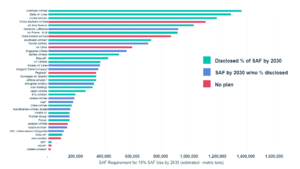
According to S&P Global, biobunker sales in Singapore will increase from 140,200 tons in 2022 to 518,000 tons in 2023. The Maritime and Port Authority of Singapore has highlighted this growth in the graph below:
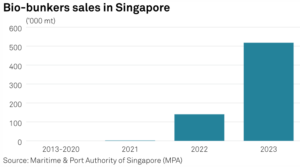
This advance in the bioenergy sector in Asia has the support of major container shipping companies such as Maersk and Hapag-Lloyd, which are supplied with bunker fuel in Singapore and have structured targets to achieve net zero emissions by 2050.
Initiatives also support this progress in the use of maritime biofuels. The European Union has adopted the FuelEU Maritime program, which sets maximum limits for greenhouse gases (GHG) generated by ships docking in European ports. The aim is to gradually reduce GHGs in maritime transport, with targets of 2% by 2025 and up to 80% by 2050.
Read also:
The bioenergy market in Asia is in its infancy and faces common barriers for a raw material on the rise. The MSCI Sustainability Institute cites market immaturity and price as the main obstacles for the future.
To increase the biofuel blending rate by 2030, numerous partnerships between carriers and producers are needed to expand the supply of SAF and biobunkers. In 2022, for example, SAF production represented just 0.1% of the total volume of conventional aviation fuel.
IATA (International Air Transport Association) data shows an increase in SAF prices and low initial growth in supply:
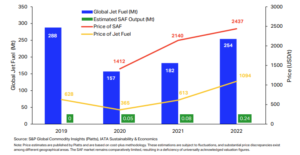
The institution itself states that a combination of technological solutions will be needed, with SAF being a key component in reducing carbon emissions in the air transport sector. For a substantial increase in the production of this biofuel, IATA points to greater collaboration between governments and the industry, as well as synchronized strategic policies and time for aviation to meet realistic targets.
Some short-term measures are being adopted to advance the bioenergy market in Asia. Singapore’s Minister of Transport has announced that there will be a tax on renewable fuel and the cost will be passed on to the end customer until the industry finds a more viable financing model.
By 2050, the costs of achieving net zero emissions are estimated at between US$1.45 trillion and US$3.2 trillion, depending on the aviation sector. To achieve this, it is necessary to increase the use of SAF to 65% in this period.
Read also:
In addition to Singapore, other Asian nations are also encouraging the use of biofuels with structured targets for the future. Here are the main ones:
Source: The Straits Times
Receive other informative content about the commodities market directly in your e-mail. Subscribe to Hedgepoint’s newsletter and turn risks into opportunities with rich materials prepared by experienced professionals.

Rua Funchal, 418, 18º andar - Vila Olímpia São Paulo, SP, Brasil
Contato
(00) 99999-8888 example@mail.com
Section
Home
O que Fazemos
Mercado
Quem Somos
HUB
Blog
Esta página foi preparada pela Hedgepoint Schweiz AG e suas afiliadas (“Hedgepoint”) exclusivamente para fins informativos e instrutivos, sem o objetivo de estabelecer obrigações ou compromissos com terceiros, nem de promover uma oferta ou solicitação de oferta de venda ou compra de quaisquer valores mobiliários, commodity interests ou produtos de investimento.
A Hedgepoint e suas associadas renunciam expressamente a qualquer uso das informações contidas neste documento que direta ou indiretamente resulte em danos ou prejuízos de qualquer natureza. As informações são obtidas de fontes que acreditamos serem confiáveis, mas não garantimos a atualidade ou precisão dessas informações.
O trading de commodity interests, como futuros, opções e swaps, envolve um risco substancial de perda e pode não ser adequado para todos os investidores. Você deve considerar cuidadosamente se esse tipo de negociação é adequado para você, levando em conta sua situação financeira. O desempenho passado não é necessariamente indicativo de resultados futuros. Os clientes devem confiar em seu próprio julgamento independente e/ou consultores antes de realizar qualquer transação.
A Hedgepoint não fornece consultoria jurídica, tributária ou contábil, sendo de sua responsabilidade buscar essas orientações separadamente.
A Hedgepoint Schweiz AG está organizada, constituída e existente sob as leis da Suíça, é afiliada à ARIF, a Associação Romande des Intermédiaires Financiers, que é uma Organização de Autorregulação autorizada pela FINMA. A Hedgepoint Commodities LLC está organizada, constituída e existente sob as leis dos Estados Unidos, sendo autorizada e regulada pela Commodity Futures Trading Commission (CFTC) e é membro da National Futures Association (NFA), atuando como Introducing Broker e Commodity Trading Advisor. A Hedgepoint Global Markets Limited é regulada pela Dubai Financial Services Authority. O conteúdo é direcionado a Clientes Profissionais e não a Clientes de Varejo. A Hedgepoint Global Markets PTE. Ltd está organizada, constituída e existente sob as leis de Singapura, isenta de obter uma licença de serviços financeiros conforme o Segundo Anexo do Securities and Futures (Licensing and Conduct of Business) Act, pela Monetary Authority of Singapore (MAS). A Hedgepoint Global Markets DTVM Ltda. é autorizada e regulada no Brasil pelo Banco Central do Brasil (BCB) e pela Comissão de Valores Mobiliários (CVM). A Hedgepoint Serviços Ltda. está organizada, constituída e existente sob as leis do Brasil. A Hedgepoint Global Markets S.A. está organizada, constituída e existente sob as leis do Uruguai.
Em caso de dúvidas não resolvidas no primeiro contato com o atendimento ao cliente (client.services@hedgepointglobal.com), entre em contato com o canal de ouvidoria interna (ombudsman@hedgepointglobal.com – global ou ouvidoria@hedgepointglobal.com – apenas Brasil) ou ligue para 0800-8788408 (apenas Brasil).
Integridade, ética e transparência são valores que guiam nossa cultura. Para fortalecer ainda mais nossas práticas, a Hedgepoint possui um canal de denúncias para colaboradores e terceiros via e-mail ethicline@hedgepointglobal.com ou pelo formulário Ethic Line – Hedgepoint Global Markets.
Nota de segurança: Todos os contatos com clientes e parceiros são realizados exclusivamente por meio do nosso domínio @hedgepointglobal.com. Não aceite informações, boletos, extratos ou solicitações de outros domínios e preste atenção especial a variações em letras ou grafias, pois podem indicar uma situação fraudulenta.
“Hedgepoint” e o logotipo “Hedgepoint” são marcas de uso exclusivo da Hedgepoint e/ou de suas afiliadas. O uso ou reprodução é proibido, a menos que expressamente autorizado pela HedgePoint.
Além disso, o uso de outras marcas neste documento foi autorizado apenas para fins de identificação. Isso, portanto, não implica quaisquer direitos da HedgePoint sobre essas marcas ou implica endosso, associação ou aprovação pelos proprietários dessas marcas com a Hedgepoint ou suas afiliadas.
aA Hedgepoint Global Markets é correspondente cambial do Ebury Banco de Câmbio, de acordo com a resolução CMN Nº 4.935, DE 29 DE JULHO DE 2021, Artigo 14 do Banco Central do Brasil (BACEN).
Para mais informações sobre nosso parceiro, serviços disponíveis, atendimento e ouvidoria, acesse o link a seguir: https://br.ebury.com/